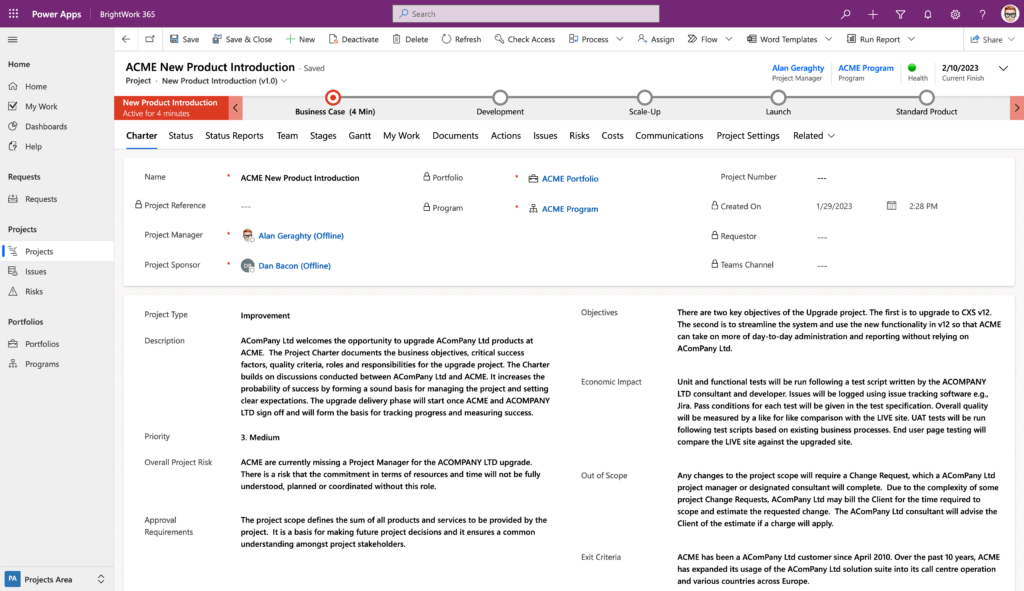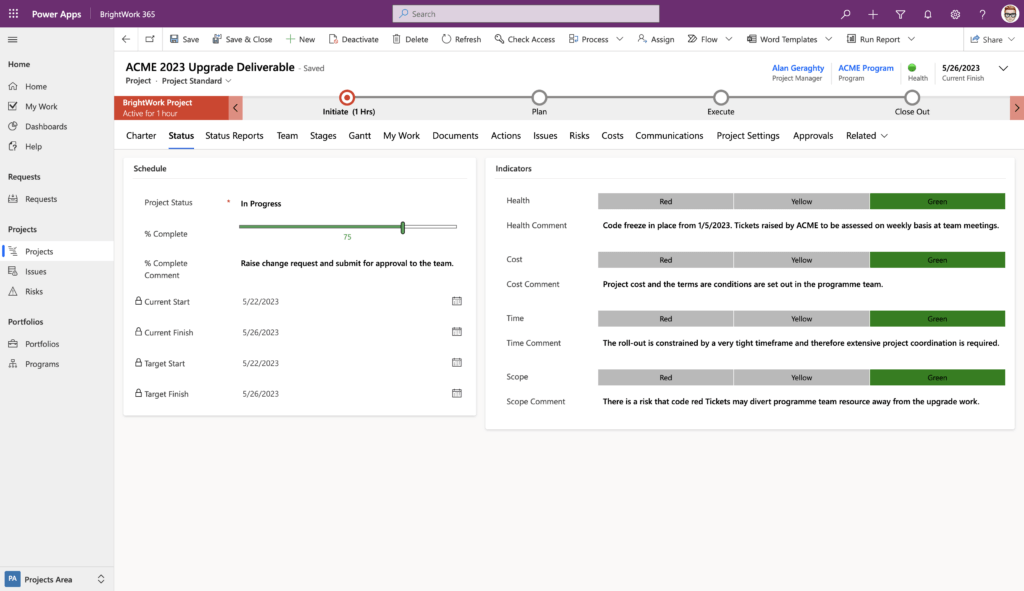How Does Poor Communication Lead to Project Failure?
Poor communication is a common cause of project failure. The way team members communicate can determine whether a project succeeds or fails. Effective communication guides team collaboration and ensures alignment with project goals.
Identifying the impact of poor communication is essential for developing a project plan that genuinely addresses the needs of your project.
This article covers the main reasons communication fails in projects, including the challenges of remote work.
It also offers practical strategies to communicate effectively. From the planning to the execution stage, you’ll learn how to improve project communication and drive your projects toward success.
Collaborate on projects in one place with Microsoft Teams and BrightWork 365
Work seamlessly from anywhere, with BrightWork 365 and Microsoft Teams.

4 Reasons for Poor Project Communication
Effective communication breakdowns are often due to several key factors, which can create serious challenges in keeping your project on track.
1. Taking Communication for Granted
Effective communication often fails because we take it for granted. Project managers assume that communication happens through in-person and virtual meetings, using emails and IM, updating documents, etc.
However, this passive communication approach overlooks the importance of active engagement with the entire team. Team members scramble to understand the big picture without real visibility and direction.
2. No project communication plan
High-performing organizations prioritize structured communication to overcome cultural barriers and align stakeholders, driving higher completion rates and smoother collaboration.
A project communication plan is a blueprint for communication processes during your project. It provides the right information to the right person at the right time in a format that works for them.
Without it, teams struggle with unclear objectives and disorganization, especially with remote teams across different time zones. For more insights on creating an effective communication plan for a project, check out our detailed guide.
3. Lack of stakeholder engagement
If you don’t have a communication plan, you’ll also encounter stakeholder engagement and vendor management problems.
The active engagement of stakeholders is critical to ensure that everyone involved understands the project’s goals and progress. Without it, misalignment and frustration can occur.
4. No project management software
Too many tools, unclear assignments, and remote team members can quickly lead to confusion.
An effective project management software can centralize internal communications and streamline communication.
What are the Consequences of Poor Project Communication?
Ineffective communication can have a domino effect that results in project failure. Below are two major consequences to consider:
1. Mismanaged Requirements
47% of failed projects are linked to requirements management. Within these cases, 75% reported poor communication led to misplanned requirements.
This makes sense as many tools for gathering requirements, such as focus groups, meetings, and interviews, rely on clear communication from the project manager and various contributors.
If everyone has a different understanding of the requirements, you’ll quickly have to manage the following:
Scope Creep
When project boundaries are unclear or communicated, the project can expand beyond its original scope, leading to delays and budget overruns.
Resource Shortages
Misaligned requirements can result in inadequate resource allocation, impacting the project timeline and quality.
Ineffective Solutions
Without a clear understanding of the requirements, the final deliverables may fail to meet the original objectives, rendering the project ineffective.
Damaged Stakeholder Relationships
Poor communication can lead to unmet expectations, eroding stakeholder trust and confidence.
2. Reduced Collaboration
Effective leadership and collaboration are only possible with communication between the team! It is needed to keep the team on track, whether through instructions, questions, brainstorming, and problem-solving.
Collaboration relies heavily on active listening, as team members must be willing to compromise and be open to new ideas while presenting respectful challenges. Poor communication can quickly isolate team members, disconnecting them from the project’s purpose, their roles, and the value of their contributions.
When communication breaks down:
- Tasks are executed in silos, reducing efficiency and alignment.
- Conflicts emerge as team members lose track of completed and upcoming tasks.
To prevent these issues, focus on improving communication practices across your project team.
4 Ways to Improve Communication On Your Projects
Effective communication is the backbone of successful project management. It ensures clarity, mutual understanding, and alignment among team members and stakeholders. Consider the following 4 approaches to improving project communication:
1. Develop a Communication Plan
Communication plans increase project success. Your goal should include project objectives, detailing the types and modes of communication, and scheduling regular meetings to ensure ongoing alignment.
If your team is working remotely, use the plan to set clear expectations. Establish how often meetings should occur and specify which communication channels suit different purposes.
2. Engage Stakeholders
Align your communication plan with key stakeholders. This involves understanding and incorporating their communication preferences into your project management communication strategies.
As the project progresses, refine communications to sustain stakeholder engagement and minimize any resistance to the project.
3. Encourage Team Collaboration
Research highlights the importance of communication for team productivity.
For example, a 2024 State of Business Communication report by Grammarly and The Harris Poll found that 84% of business leaders attribute higher productivity to improved communication.
This insight is crucial in today’s diverse and often remote work environments, where clear and inclusive communication can bridge gaps and foster collaboration.
Evaluate your team’s communication practices:
Primary Communication Tools
Is there an over-dependence on email, or are more dynamic platforms in use?
Encouraging Spontaneity
Are there designated spaces or platforms that facilitate spontaneous, informal conversations?
Meeting Dynamics
Are meetings structured to be engaging and productive, or do they need a revamp?
Remote Communication
How effectively are video and other tools used to maintain personal connections in remote settings?
Personal Communication Styles
Knowing your style (be it passive, aggressive, passive-aggressive, or assertive) and that of your team can lead to more tailored and effective interactions.
Remember, not just the frequency of communication matters, but its quality. Creating an environment where every team member feels heard and valued is critical to building trust, engagement, and productivity.
Discover more communication secrets that great leaders use to enhance team productivity and collaboration.
4. Use Project Management Software
Implementing a ‘single source of truth’ can be a game-changer for your team and stakeholders.
With project management tools, every project team member can find key details like schedules, updates, and assignments in one place.
A centralized system reduces confusion and ensures everyone works with the same information.
How BrightWork 365 Enhances Project Communication
BrightWork 365 transforms your project management process by enhancing clarity, collaboration, and efficiency. Here’s how it can optimize your project communication:
1. Centralized Project Goals and Objectives

A centralized approach to project goals and objectives is important for team alignment and clarity. BrightWork 365 offers a structured way to set and track these goals.
Clarity and Alignment
The project site is a central hub where every team member can clearly understand the project’s objectives and key results, reducing miscommunication and misaligned efforts.
Dynamic Goal Tracking
As goals shift during the project, BrightWork 365 allows for dynamic updating and tracking of these changes, ensuring the team is always aligned with the current objectives.
2. Streamlined Access to Project Documents

Efficient document management is vital to project success. BrightWork 365 provides a centralized system for managing all project-related documents, enhancing accessibility and organization.
Document Management
Store, share, and manage all your project-related documents in one place to ensure that everyone has access to the latest versions of documents.
Version Control
Track changes with built-in version control to maintain document accuracy over time, eliminating the confusion of multiple interpretations.
3. Enhanced Task Management

Task management is the heartbeat of project execution. BrightWork 365 simplifies task visibility and assignment, fostering a more efficient and collaborative work environment.
Task Visibility and Assignment
Easily find, assign, and update tasks. The platform’s intuitive interface allows team members to understand their responsibilities and the status of their tasks quickly.
Collaborative Task Completion
Team members can collaborate on tasks, share information, and flag issues directly within the system.
4. Real-Time Project Tracking

Keeping a real-time pulse on project progress supports timely decisions and course corrections.
Progress Monitoring
Track the overall progress of the project with real-time updates. This feature allows for proactive adjustments and decision-making to keep the project on track.
Milestone Achievement
Celebrate and monitor project milestones as the project progresses, keeping the team motivated and focused.
5. Risk and Issue Logging

Proactively addressing risks strengthens project resilience. BrightWork 365 identifies trends and patterns, enabling proactive mitigation strategies and documenting resolutions for future reference.
Proactive Risk Management
Log and monitor potential risks and trends to implement preventive measures.
Issue Resolution Tracking
Record how problems are resolved, creating a knowledge base for future projects and enhancing the team’s problem-solving capabilities.
6. Stakeholder Engagement with Real-Time Dashboards

Transparent reporting builds trust and keeps project stakeholders informed. BrightWork 365’s real-time dashboards provide transparency for stakeholder engagement and trust.
High-Level Data Visualization
Dashboards offer a a high-level overview of project status, health, and key metrics in real time.
Customizable Dashboards
Tailor dashboards to show relevant data for different stakeholders, ensuring that each stakeholder has access to the information most pertinent to their needs.
7. Additional Features for Comprehensive Project Management
BrightWork 365 goes beyond basic project management functionalities. Explore how our Microsoft 365 project management can optimize your project efficiency and collaboration in our detailed guide.
Integration Capabilities
Seamlessly integrate with your organization’s other tools and platforms for a unified workflow.
Customizable Workflows
Adapt the platform to fit your specific project management processes with customizable workflows.
Security and Compliance
Ensure data security and compliance with industry standards, giving the team and stakeholders peace of mind.
Editor’s Note: This post was originally published in November 2016 and has been updated for freshness, accuracy, and comprehensiveness
Standardize your project management processes with Microsoft 365
Watch a demo of BrightWork 365 project and portfolio management templates for Microsoft 365, Power Platform, and Teams.

